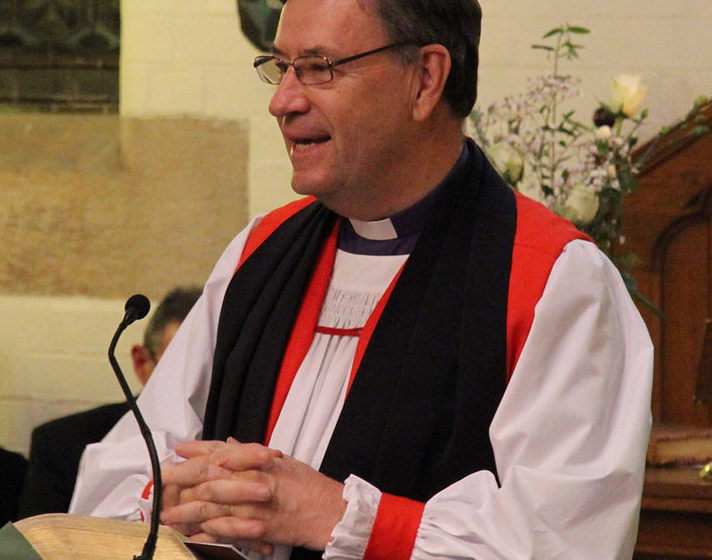The soon to be retired Archbishop of Sydney gave a farewell address at the closing of Synod. His address drew heavily upon the pastoral epistles to Timothy and Titus, communicating a them centered on the idea of the need to guard the faith.
“Episcopal leadership, to a large extent, is a continuation of the roles of Timothy and Titus, servants of Christ to whom the responsibility of selecting and ordaining belongs, a specific application of passing on the gospel to the next generation. If there were a biblical precedent for Anglican episcopacy, it would be Timothy and Titus.”
After first bemoaning fellow Anglican bishops who have, in his mind, been leading people away he lauded the election of Jay Behan to be a “bishop” to a dozen breakaway parishes in New Zealand opposed to that church’s (relatively tepid) moves toward full inclusion and marriage equality.
He began by asking how should the faithful respond to false leadership;
“Regrettably, not all who are elected bishop are capable of being guardians of the faith. As Anglicans, we recognise both the merits and the risks of electing bishops to exercise oversight of the church of God. What happens when bishops fail to act as guardians of the faith?”
And answered his own query in telling of the response of Behan and the other parishes who felt estranged from recent changes in the Anglican Church in Aotearoa, New Zealand and Polynesia.
“So what do faithful Anglicans do when their bishops betray God’s word, as did Israel’s shepherds of old? How do you remain Anglican when you have no bishop? How do you hold onto the time-honoured ministry of bishops as guardians of the faith and doctrine, when your own bishop is no longer a worthy shepherd? Just as Canon David Short chose to leave the Anglican Church of Canada when his Diocese of New Westminster approved of same-sex blessings, Jay Behan and his congregation, along with eleven other congregations and their ministers, decided to leave the established Anglican Church. But what next? They could have each become an independent church community, but they did not. They could have formed a fellowship of independent churches, but they did not. Instead, they wanted to continue owning the faith as expressed by the Anglican formularies of the Reformation. So they asked for help. They looked to the Gafcon Primates and to Australian Anglicans, who gladly assisted them with resources to establish an extra provincial diocese.”
While recognizing the departure from traditional Anglican ecessiology and polity, he suggested that the breakaways are the true heirs of Anglicanism and that it is not the bonds of history or relationship with Canterbury that has any bearing on Anglican identity, but rather acceptance to a very evangelical understanding of the primacy of Scripture combined with the 39 Articles and the BCP.
“What makes it authentically Anglican is, as our Constitution expresses it, its allegiance to the Bible as ‘the ultimate rule and standard of faith given by inspiration of God and containing all things necessary for salvation’, whose teaching is confessed in the 39 Articles and given liturgical form in the Book of Common Prayer.”
He then pivoted to a complaint about the diocese of Wangarrata (and Newcastle) and its decision to move ahead with marriage equality, bemoaning their “breach of fellowship;” apparently not equating their breach to the breach of fellowship New Zealand he had just lauded.
“Friends, we have entered treacherous waters.
I fear for the stability of the Anglican Church of Australia. These developments have the potential to fracture our fellowship and impair our communion.”
He then suggested that the upcoming General Synod of the Australian church make a firm stand in favor of traditional understandings of marriage. He further suggested that those who would desire to make changes should go and start their own churches.
“My own view is that if people wish to change the doctrine of our Church, they should start a new church or join a church more aligned to their views – but do not ruin the Anglican Church by abandoning the plain teaching of Scripture. Please leave us. We have far too much work to do in evangelising Australia to be distracted by the constant pressure to change our doctrine in order to satisfy the lusts and pleasures of the world.”
The remainder of the address was largely dedicated to the Archdioceses strategic plan, the Archbishop’s understanding of his role and voice in domestic politics and the planning for the election of a new archbishop.
In regards to the strategic plan, he did admit that they had fallen short across several ministry and evangelism efforts, but that nevertheless positive outcomes had been seen.
He closed with a hope that the divisiveness and animosity which had surrounded his own election would not be repeated this time around.
Seven years ago, our diocese was polarised by the early announcement of two nominees for the office of Archbishop. This proved to be an unhealthy aspect of our diocesan life, regrettably fuelled by many unrestrained comments on social media. I believe we have matured as a Diocese and especially as a Synod through that experience. I do not detect the kind of angst that was apparent during the lead up to the next election, nor the similar expressions of anxiety and factional friction that the two previous elections exhibited. Rather, I do detect a growth in our love for one another. While it is proper for members to propose names for the Synod’s consideration, I am hopeful that more than two names will be proposed
You can read the address in its entirety here

